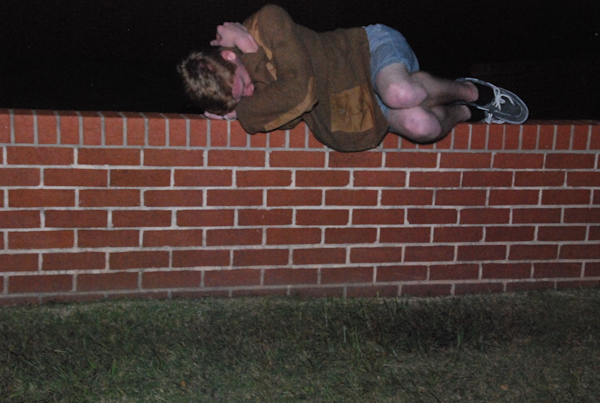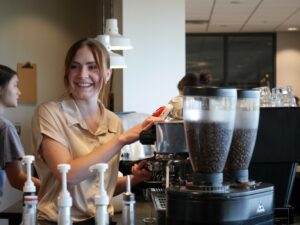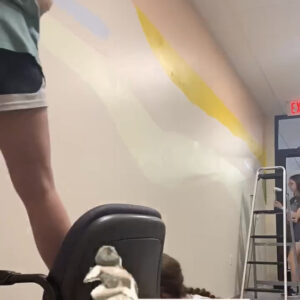Photo by: Henoc Kivuye
According to the Foundation for Oklahoma City Public Schools, more than 17,000 children in the Oklahoma City area are living in households that make less than $11,000 a year.
Poverty across the United States is on the rise. The U.S. Census Bureau recently released its latest data on poverty in America and the statistics proved devastating to some. While many brood over the numbers and statistics, others are attempting to put a face and name to the specific numbers.
Wishing Well, a club founded by Oklahoma Christian University alumni, has been able to impact a substantial amount of lives in developing countries.
Five years ago, alumni Ryan Groves and his brother Brendan began Wishing Well as a small student organization focused on using the power of creativity and community to combat the water crisis. They saw the need to step out of the norm and help those in need.
David Lopez, a senior from Dallas, Texas, outlines his current involvement in the program and why he finds it to be a beneficial investment.
“I started as chaplain last year and the second semester I started doing devotionals over doing good work,” Lopez said. “Now I am president with Jessica [Frost]. Our early main goal now is spreading the word about Wishing Well to get people excited about this cause. Later we’ll progress into creating fundraising events, which will involve a lot of creativity.”
Lopez discussed why he cares about the issue.
“Poverty exists…” Lopez said. “It can exist anywhere. Fighting poverty in a short-term kind of way is good but there should be more permanent ways of fighting it.”
According to the World Health Organization, there are 884 million people who do not have access to clean water. Unclean water is responsible for 80 percent of all disease and over 3 million deaths each year. Wishing Well does not see this as an insurmountable problem; they see it as an opportunity to become involved and to be challenged.
“We see the water crisis as our chance to rally together as a community to do something truly incredible,” Wishing Well’s website said. “We believe that the world’s greatest challenge can be overcome by uniting a generation to act as one. What we’ve discovered is that by loving our neighbors around the world we learn to love our own communities. We call this truly holistic development.”
While it is important to look to issues that are international and hard-hitting across the world, there is still a substantial battle to be fought at home.
The 2013 statistics from the United States Census Bureau highlighted the lingering scars from the 2007-2009 recession and showed just how devastating the income gap in America has become.
Although the number of people in poverty went up from 46.2 million in 2011, the national poverty rate was unchanged at 15 percent, the annual report said. The poverty threshold in 2012 was an income of $23,492 for a family of four. These numbers show that one in seven individuals are below the poverty line.
Christian Ohlweiler, a freshman international student from Paraguay, spoke of his desire to help those in America.
“Being that I am not from here, I really do not know much about customs and tradition in this country, but what I do know is that, such as in my country, there is a problem with the poor,” Ohlweiler said. “Many people need help and many people want to help except they don’t.”
Lopez expounded on that statement.
“We are fighting the water crisis on an international level,” Lopez said. “I am involved in other clubs that fight things closer to home but in this mission it is not that easy to waste time and resources…we have fun and can come up with crazy-fun fundraising events. Those are the events that help us reach our goal. It is a mission and we always keep that in mind, but the main thing we do outside the events is tell people about Wishing Well.”
Wishing Well hosts a walk for water and poverty simulation, a fundraiser where people walk barefoot with gallon jugs of water and simulate the normal day-to-day routine for those in lesser-developed countries.
In addition to Wishing Well, there are many different organizations and foundations in the Oklahoma City area that need volunteers to help. There are local food pantries, United Way and programs put on by Memorial Road Church of Christ.
“It is definitely an issue,” Lopez said. “There are churches that go downtown and give food and clothing to the poor. A few clubs go and help at the mission downtown.”
There are also people getting involved on a national level. According to an article from Yahoo Finance, Panera Bread’s CEO Ron Shaich spent a week trying to feed himself on only $4.50 a day in order to raise hunger awareness.
The New York Times revealed that the average person on food stamps receives only $4.50 a day in assistance. When Schaich went grocery shopping on this budget, he found he couldn’t afford coffee, fruit, yogurt or milk. This left him eating cereal, lentils, chickpeas, carrots and pasta the entire week.
“I snapped at her [Shaich’s wife, Nancy] for over-portioning my spaghetti,” Shaich said in the Yahoo Finance article. “I felt so much anxiety about the possibility of running out of pasta…I have to imagine that this is a common source of conflict in households marked by food insecurity.”
Getting involved is a key factor in ushering in change and relief for those struggling both internationally and locally.
“Those that are involved can choose to put as much effort as they desire,” Lopez said. “We will use people as much as they want to be used. Some people are in charge of events, with the help of others, while others choose to go to these events. It is a fun way to be involved in a mission. It is a way to be purposely doing God’s work and its right here on campus.”















Be First to Comment